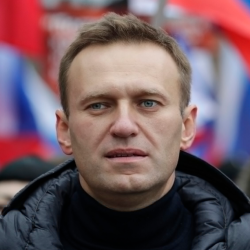
Alexei Navalny
| Date of Birth | : | 04 Jun, 1976 |
| Date of Death | : | 16 Feb, 2024 |
| Place of Birth | : | Butyn, Russia |
| Profession | : | Russian Lawyer |
| Nationality | : | Russian |
Alexei Anatolievich Navalny was a Russian opposition leader, lawyer, anti-corruption activist and a political prisoner. He organised anti-government demonstrations and ran for office to advocate reforms against corruption in Russia, and against President Vladimir Putin and his government. Navalny was a Russian Opposition Coordination Council member. He was the leader of the Russia of the Future party and founder of the Anti-Corruption Foundation (FBK). He was recognised by Amnesty International as a prisoner of conscience, and was awarded the Sakharov Prize for his work on human rights.
Early Life and Education
Navalny was of Russian and Ukrainian descent.[45][46] His father was from Zalissia, a former village near the Belarusian border that was relocated due to the Chernobyl disaster in Ivankiv Raion, Kyiv Oblast, Ukraine. Navalny grew up in Obninsk, about 100 kilometres (62 mi) southwest of Moscow, but spent his childhood summers with his grandmother in Ukraine, acquiring proficiency in the Ukrainian language. His parents, Anatoly Navalny, and Lyudmila Navalnaya, own a basket-weaving factory, which they ran from 1994, in the village of Kobyakovo, Vologda Oblast. As of 2012, they were still running the factory.
Navalny graduated from Kalininets secondary school (level 3 according to the ISCED) in 1993. He graduated from the Peoples' Friendship University of Russia in 1998 with a law degree. He then studied securities and exchanges at the Financial University under the Government of the Russian Federation, graduating in 2001. He received a scholarship to the Yale World Fellows program at Yale University in 2010.
Legal Career
From 1998, Navalny worked as a lawyer for various Russian companies. In 2009, Navalny became an advocate and a member of advocate's chamber (bar association) of Kirov Oblast (registration number 43/547). In 2010, due to his move to Moscow, he ceased to be a member of advocate's chamber of Kirov Oblast and became a member of advocate's chamber of Moscow (registration number 77/9991). In November 2013, after the judgement in the Kirovles case had entered into force, Navalny was deprived of advocate status.
Family and Personal Life
Navalny was married to Yulia Abrosimova and had two children, daughter Darya (Dasha) Navalnaya, who began undergraduate studies at Stanford University in September 2019, and son Zakhar.
Starting 1998, he lived primarily in a three-room apartment in Maryino District in southeast Moscow. Navalny was originally an atheist, but later became a member of the Russian Orthodox Church. He has said that turning to the Orthodox church has made him feel a "part of something large and universal."
On 17 January 2021, Navalny was again arrested as he was returning to Russia, after having had to leave the country for medical treatment in Germany for a poisoning attempt against his life that had recently occurred in Russia. He remained incarcerated (initially in the IK-2 penal colony) and was housed in the IK-6 maximum security prison in Melekhovo, Vladimir Oblast. Navalny was listed by Amnesty International (AI) as a prisoner of conscience in May 2021, meaning that AI held that Navalny's incarceration was primarily due to his political beliefs. In addition to his native Russian, Navalny also spoke English.
